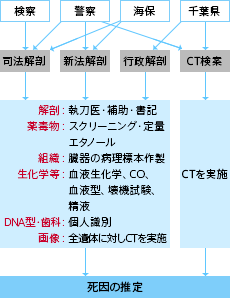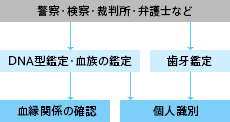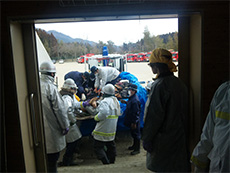Investigation of Cause of Death
Education and Research Center of Legal Medicine, Chiba University performs around 350 autopsies a year (366 in 2013) at the request of the police, prosecutors, the coastguard, Chiba Prefectural Government, and other agencies, including judicial autopsies (autopsies of crime victims or suspected crime victims with the permission of the court), investigative autopsies (autopsies performed under the authority of the chief of police under the Act on the Investigation of Cause of Death and on Identification of Bodies Handled by the Police), and approved autopsies (autopsies performed by the prefectural government with the approval of the family of the deceased), which in principle include CT scanning, toxicological testing, and pathological testing in every case. These forensic investigations concerning death are used to determine the cause of death. In particular, however, the determination of the type of death (due to illness, accident, homicide, or suicide) is only possible by combining the results of those tasks performed by the police, such as investigating the circumstances surrounding the death and interviewing the people concerned, with the forensic medical tests performed by our Center; therefore, liaising with the police and other agencies is essential. By determining the cause of death, we aim to protect the health of the living residents of Japan and Chiba Prefecture and to prevent crime and accidents, thus contributing to the safety of the community.



